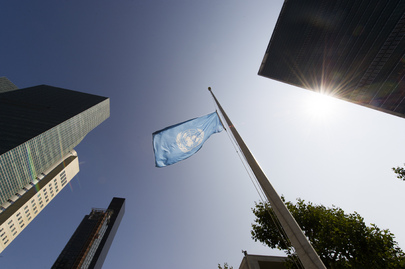As climate negotiations continue in the Amazonian city of Belém, Brazil, governments, UN agencies and partners have adopted the Belém Health Action Plan, placing an emphasis on addressing healthcare inequalities.
For updates on all the action and UN News coverage so far, head to our dedicated page here.
A planet heading to ‘intensive care’
The adoption took place on COP’s designated Health Day – a recognition that the climate crisis is also a health crisis.
“If our planet were a patient, it would be admitted to intensive care,” World Health Organization (WHO) Director-General Tedros Adhanom Ghebreyesus warned on the eve of the conference.
Extreme heat, floods, droughts and storms are not only environmental threats –they are driving disease outbreaks, food and water insecurity, and the disruption of essential health services.
A patient recovering from fistula repair surgery is examined by in the recovery ward at Dayniile Hospital, Mogadishu, Somalia.
Blueprint for resilience
Developed by the WHO, UN University (UNU) and other UN partners in collaboration with the Brazilian Government, the Action Plan sets out practical steps to integrate health into climate strategies
- Strengthening health systems to withstand climate shocks
- Mobilising finance and technology for adaptation and
- Ensuring communities have a voice, promoting their participation in governance.
Brazil’s Health Minister Alexandre Padilha described the launch as “a crucial moment to demonstrate the strength of the health sector in global climate action”
Civil society demonstration at COP30
Solutions hub
Thursday’s high-level sessions in the main conference rooms are dominated by speeches and discussions about climate and health – but throughout COP30, the WHO-led Health Pavilion has been the hub for solutions and dialogue.
The topics covered at the pavilion range from AI to waste management, jobs, education and human rights – all from the perspective of health.
Friday in the pavilion will be dedicated to the Alliance for Transformative Action on Climate and Health, a WHO-led initiative to accelerate the transition to climate-resilient and low carbon health systems.
Food Waste Breakthrough
Also today, the UN Environment Programme (UNEP) and its partners launched an initiative to cut food waste in half by 2030 and cut up to seven per cent of methane emissions as part of efforts to slow climate change.
UNEP notes that the world wastes more than one billion tonnes of food every year, contributing up to 10 per cent of global greenhouse gas emissions and accounting for up to 14 per cent of methane emissions, which is a short-lived climate pollutant that is 84 times more potent at warming the atmosphere than carbon dioxide over 20 years.
Funded by the Global Environment Facility, the UN Environment Programme will launch a $3 million, four-year global project to implement the targets of the Food Waste Breakthrough.
Source of original article: United Nations (news.un.org). Photo credit: UN. The content of this article does not necessarily reflect the views or opinion of Global Diaspora News (www.globaldiasporanews.com).
To submit your press release: (https://www.globaldiasporanews.com/pr).
To advertise on Global Diaspora News: (www.globaldiasporanews.com/ads).
Sign up to Global Diaspora News newsletter (https://www.globaldiasporanews.com/newsletter/) to start receiving updates and opportunities directly in your email inbox for free.






























